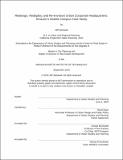Redesign, redeploy, and re-envision urban corporate headquarters : Amazon's Seattle campus case study
Author(s)
Jamawat, Jeff.
Download1140446657-MIT.pdf (13.16Mb)
Other Contributors
Massachusetts Institute of Technology. Department of Urban Studies and Planning.
Massachusetts Institute of Technology. Center for Real Estate. Program in Real Estate Development.
Advisor
Brent Ryan.
Terms of use
Metadata
Show full item recordAbstract
Corporate headquarters have tremendous impacts on cities and the built environment. As companies expand, downsize, and adapt through the business cycles and industry transformations, the size of corporate workforce and real estate holdings are in constant flux, resulting in a dynamic urban system that continues to shape and reshape physical planning and urban morphologies of cities. This thesis focuses on corporate headquarters in an urban environment where the main campus is physically located in the downtown core or near the central business district. Using Amazon campus in Seattle as a case study, the research investigates past experiences in adaptive reuse of signature corporate headquarters in the US, explores Amazon growth and its impacts on urbanism, and develops a custom-built app that visualizes Amazon-occupied office space in Seattle to inform re-tenant and real estate disposition strategies in a futuristic scenario where Amazon shifts the activity center away from the downtown area. Local and regional planning agencies could potentially use this research as a framework for future economic resilience planning initiatives and dialogues.
Description
This electronic version was submitted by the student author. The certified thesis is available in the Institute Archives and Special Collections. Thesis: M.C.P., Massachusetts Institute of Technology, Department of Urban Studies and Planning, 2019 Thesis: S.M. in Real Estate Development, Massachusetts Institute of Technology, Program in Real Estate Development in conjunction with the Center for Real Estate, 2019 Cataloged from student-submitted PDF version of thesis. Includes bibliographical references.
Date issued
2019Department
Massachusetts Institute of Technology. Department of Urban Studies and Planning; Massachusetts Institute of Technology. Center for Real Estate. Program in Real Estate Development; Massachusetts Institute of Technology. Center for Real EstatePublisher
Massachusetts Institute of Technology
Keywords
Urban Studies and Planning., Center for Real Estate. Program in Real Estate Development.